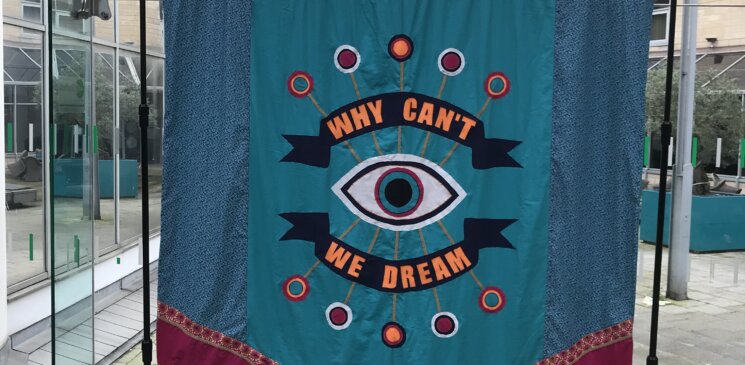
In late 2023, we were pleased to be awarded an Institutional Fund for Research Culture award from the Wellcome Trust; Wellcome Anti-ableist Research Culture (WAARC). Ableism is an ideology that idealises able-bodied-and-mindedness.
https://www.sheffield.ac.uk/ihuman/wellcome-anti-ableist-research-culture-waarc
In late 2023, we were pleased to be awarded an Institutional Fund for Research Culture award from the Wellcome Trust; Wellcome Anti-ableist Research Culture (WAARC). Ableism is an ideology that idealises able-bodied-and-mindedness.
We seek to contest this ideology. We are one of 24 institutions funded by the Wellcome Trust to research, develop and enhance research culture within their universities (see Lewis-Wilson et al, 2023). WAARC brings together disabled and non-disabled academics at the University of Sheffield – working together with disabled people’s organisations – to find and promote anti-ableist practices.
We find ourselves doing this work in the midst of an Equality, Diversity and Inclusion (EDI) revolution as universities, funders and researchers have begun to recognise that university research cultures are exclusionary. And yet, disabled people, as students, researchers, professional services colleagues and in other roles, have yet to experience the benefits of this EDI revolution.
Their hopes, dreams, aspirations and rights are yet to be fully realised. WAARC works to address this omission by bringing together researchers at all career stages and professional services colleagues from across the University of Sheffield – working collaboratively and in co-production with disabled people’s organisations – to develop a suite of activities that centre disability and contest systemic ableism in relation to three Priority Areas:
- Environment will experiment with new ideas for inclusive recruitment and employment.
- Development will produce new guidelines on accessible research events and deliver a new course on inclusive research methods to raise capacities of Postgraduate Researchers and Early Career Researchers.
- Collaboration will put disabled people front and centre and in collaboration will offer funding, via an open call, to other researchers and professional services colleagues to produce their own inclusive research projects and we will revisit the Concordat on Researcher Development to ensure inclusivity.
WAARC aspires to promote and enable an anti-ableist research environment – within our own University of Sheffield. Through a process of exploration, we want to fundamentally re-imagine and re-create a research culture driven by the premise that disability is always a desirable, creative and collective force for research, theory and practice. We have a number of aims and deliverables:
Aims
- To experiment with and create new processes, concepts and practices that create an Anti-Ableist Research Culture at the University of Sheffield.
- To work in collaboration with disabled researchers and disabled people’s organisations while being intellectually underpinned by critical disability studies theory and research.
- To pilot a number of activities that will be evaluated and scale up in relation to three Priority Areas: Environment, Development and Collaboration.
Deliverables
- Evidence of successful inclusive job creation and recruitment practices.
- Case studies of innovative and inclusive employment practices.
- A set of Guidelines for hosting anti-ableist and inclusive hybrid research events (e.g. conferences, seminars and workshops).
- A new Inclusive Research Methods course for all researchers in TUOS.
- Funding for a number of research projects delivered in collaboration with disabled people’s organisations.
- Cripping the Concordat to Support the Career Development of Researchers (centralising disability in considerations of development).
- An evaluation framework and set of Key Performance Indicators to document and benchmark progress towards delivering anti-ableist university environments at the University of Sheffield and other institutions.
One way of understanding our work is through the notion of depathologising the university, which we understand as a model that embraces disability as possibility rather than problem in order to create university and research cultures that are places where we all would like to work (Goodley, 2024). At the time of writing we are in the early stages of the Environment phase; experimenting with new ideas for inclusive recruitment and employment.
Our focus has been on Aim 1 and early work has started addressing Deliverable 1. Any engagement with the very idea of inclusive recruitment necessitates an entanglement with the complexities of ‘knowing disability’ and the ‘new wave of disability’. Recruitment into a university is of course a deeply bureaucratic process but it also demands a community response and we have already made some progress here.
We are driven by an aspiration: to create positive, inclusive and welcoming universities that invite, welcome and hope to include disabled and non-disabled applicants in their pursuit of accessing and then flourishing within the university environment. Are you with us?
Authors: Dan Goodley (1), Lucy Dunning (1), John Flint (1), Richard Franey (1), Rhea Halsey (1), Hamied Haroon (2), Helen Irvine (1), Melanie Knight (1), Antonios Ktenidis (1), Rebecca Lawthom (1), Kirsty Liddiard (1), Jacquie Nicholson (2), Katherine Runswick-Cole (1), Kelly Scargill (3), Sarah Taylor (1), Meera Warrier (1), Lauren White (1)
Affiliations: (1) University of Sheffield; (2) National Association of Disabled Staff Networks; (3) Disability Sheffield
References (hyperlinked in this blog)
Goodley, D. (2024) Depathologising the university, Pedagogy, Culture & Society, DOI: 10.1080/14681366.2024.2316007